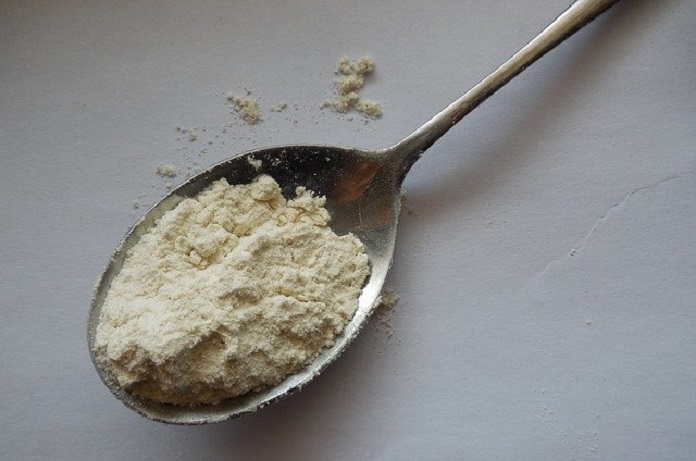Dietary fiber is important for maintaining overall health.
Fiber plays a role in controlling diseases such as heart disease, diabetes, obesity, and cancer.
Canada and the United States recommend a fiber dietary reference intake (DRI) of about 14 grams to protect the health of the heart and other organs.1
For those struggling with constipation, a doctor may suggest Metamucil, but how does Metamucil work?
Scientists have found fiber to be beneficial for several reasons.
Health benefits of fiber
Digestive movement
Fiber helps the intestine move better and faster during digestion.
For example, whole grain foods rich in fiber, will quickly move through the intestines.
This allows for an easy digestion process, and it acts as an appetite suppressant because it can make you feel full more quickly.2
Colon cleanser
Fiber is known to be a “colon cleanser”.
The colon, also known as the large intestine, is part of the digestive system in the human body. It can accumulate bacteria and buildup.
Fiber acts like a “brush” to naturally scrub the insides of the intestines, preventing bad buildup.2
Bowel regulator
Fiber draws in water, so it helps to keep the stool hydrated. The softer stool can then pass through the intestines much more easily.
This relieves constipation and the feelings of stomach pain or discomfort that come from it.
Studies have shown that high-fiber diets and moderate exercise can greatly reduce constipation.3
How Metamucil works
For those that struggle with constipation or getting their daily recommended fiber intake, a healthcare provider may suggest Metamucil.
Metamucil is an FDA-approved gluten-free fiber supplement and laxative that comes in different forms, such as powders and capsules.
One of the main ingredients of Metamucil is psyllium fiber, also referred to as ispaghula.4
It comes from the husk seeds of the plant Plantago Ova. Psyllium has a gel-like nature, and it is a well-known laxative, meaning that it loosens stool and helps with bowel movement.5
Psyllium can also act as a prebiotic. It allows good bacteria to grow in the gut, which is important for healthy functioning of both the digestive and immune systems.
The body can fight infections better and keep cells and tissues healthy.
The psyllium fiber in Metamucil works to help maintain bowel regularity and proper digestive functioning.
What else can psyllium do?
Heart disease is usually correlated with high cholesterol levels. Regulating cholesterol is important for people of all ages, but it is especially important for people over 50 years old.
Researchers have found that psyllium fiber can be beneficial in lowering the amount of bad cholesterol in the blood.5
One published article found that adding 3.4 grams of psyllium to the diet three times a day for eight weeks, reduced cholesterol levels by about 5%. No negative side effects were reported by any of the participants.
Fiber acts to slow down the amount of sugar that is absorbed into the blood.
Having a fiber-rich meal when eating sugary foods, will help lower blood glucose (sugar) levels.6 This controls appetite by making you feel fuller and by preventing overeating.
When combined with liquid, Metamucil forms a thick gel, which is said to trap some sugars taken into the body.4
In this way, sugars are absorbed into the body more slowly, reducing blood sugar levels.
How long does it take for Metamucil to work?
Metamucil can be taken by adults or children over the age of 12 – you should consult with your healthcare provider to make sure it is appropriate for you.
Dosage
Metamucil dietary supplement can be taken as a powder, capsule, thins, or gummies.
Depending on your fiber needs, the different forms will have different instructions and doses.4
The recommended dose for Metamucil powders is one serving per day. One serving is 1-2 spoons of powder in a glass with 8 ounces of liquid.
Five Metamucil capsules can be taken for one Metamucil serving. It is recommended to take the capsules one at a time.
For those struggling with dietary fiber intake and digestive problems, it is recommended to take Metamucil every day to get the best results.
Metamucil can be taken up to three times a day.
Side effects of Metamucil
Changes in bowel habits may occur when you first begin to take Metamucil.
Symptoms, such as bloating, may happen while the body adjusts to the increased fiber intake.7
Other side effects can include allergic reactions, stomach cramping, gas, or more serious symptoms such as nausea and vomiting.
Metamucil is not recommended for those with concerning stomach conditions: appendicitis, ulcers, or gastrointestinal obstruction.
Always consult a doctor before taking supplements.
References:
- Korczak, R., & Slavin, J. L. (2020). Definitions, regulations, and new frontiers for dietary fiber and whole grains. Nutrition reviews, 78(Suppl 1), 6–12. https://doi.org/10.1093/nutrit/nuz061
- Shah, B. R., Li, B., Al Sabbah, H., Xu, W., & Mráz, J. (2020). Effects of prebiotic dietary fibers and probiotics on human health: With special focus on recent advancement in their encapsulated formulations. Trends in Food Science & Technology, 102, 178–192. https://doi.org/10.1016/j.tifs.2020.06.010
- Macêdo, M. I. P., Albuquerque, M. F. M., Tahan, S., & Morais, M. B. (2020). Is there any association between overweight, physical activity, fat and fiber intake with functional constipation in adolescents? Scandinavian Journal of Gastroenterology, 55(4), 414–420. https://doi.org/10.1080/00365521.2020.1749878
- Metamucil. (n.d.). Metamucil Fiber Supplements & Meta Appetite Control | Metamucil®. Retrieved March 3, 2021, from https://www.metamucil.com/en-us
- Bell, L. P. (1989). Cholesterol-lowering effects of psyllium hydrophilic mucilloid. Adjunct therapy to a prudent diet for patients with mild to moderate hypercholesterolemia. JAMA: The Journal of the American Medical Association, 261(23), 3419–3423.https://doi:10.1001/jama.1989.03420230073029
- SINGH, B. (2007). Psyllium as therapeutic and drug delivery agent. International Journal of Pharmaceutics, 334(1–2), 1–14. https://doi.org/10.1016/j.ijpharm.2007.01.028
- Psyllium: MedlinePlus Drug Information. (n.d.). MedlinePlus. Retrieved March 4, 2021, from https://medlineplus.gov/druginfo/meds/a601104.html
Image by Jing from Pixabay



